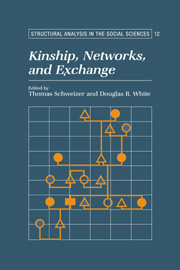Book contents
- Frontmatter
- Contents
- Preface
- List of contributors
- 1 Revitalizing the Study of Kinship and Exchange with Network Approaches
- I Representing Kinship Dynamics, Material Flow, and Economic Cooperation
- II Individual Embeddedness and the Larger Structure of Kinship and Exchange Networks
- III Marriage, Exchange, and Alliance: Reconsidering Bridewealth and Dowry
- IV Emergence, Development, and Transformation of Kin-Based Exchange Systems
- Index
II - Individual Embeddedness and the Larger Structure of Kinship and Exchange Networks
Published online by Cambridge University Press: 05 November 2011
- Frontmatter
- Contents
- Preface
- List of contributors
- 1 Revitalizing the Study of Kinship and Exchange with Network Approaches
- I Representing Kinship Dynamics, Material Flow, and Economic Cooperation
- II Individual Embeddedness and the Larger Structure of Kinship and Exchange Networks
- III Marriage, Exchange, and Alliance: Reconsidering Bridewealth and Dowry
- IV Emergence, Development, and Transformation of Kin-Based Exchange Systems
- Index
Summary
The three chapters in this section examine the issue of embeddedness at three successive levels. Böck looks at the embedding of an individual in a field of verbalized norms and values as well as at a network of personal relationships. Bollig treats a series of individuals embedded in an institutionalized moral economy of a community. Göbel examines the embedding of community members in a series of external relationships on which they depend for interregional trade. While not relating to the same community (ethnic Khasi of Meghalaya in N.E. India, the Pokot of Kenya, and the Huancar of Argentina, respectively), these studies give a sense of how social norms are internalized by individuals, how cognitive schemas are related to social action, and how individual decision making and strategies relate to the formation, maintenance, and alteration of social and economic networks.
A central problem of anthropology is how ideals relate to actual practices. Recent developments in cognitive anthropology have reconceptualized this question from a cultural perspective. Böck outlines how schema theory traces the connections between cultural ideals and actual behaviors. In doing so, she casts fresh light on how to deal in these terms with “cultural data” in the kinship domain. While cultural knowledge shapes and constrains people's behavior, it is also shaped and tailored according to people's particular individual experiences, and it is negotiated and contested in ongoing social interaction.
Information
- Type
- Chapter
- Information
- Kinship, Networks, and Exchange , pp. 109 - 112Publisher: Cambridge University PressPrint publication year: 1998
